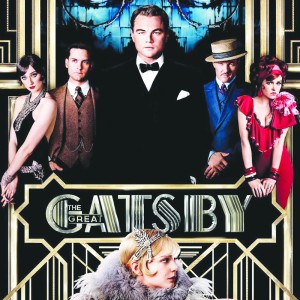“[Nick] ventured, ‘You can’t repeat the past.’
‘Can’t repeat the past?’ he cried incredulously. ‘Why of course you can!”

Unlike Jay Gatsby’s attempt to repeat the past, director Baz Luhrmann’s endeavor to bring The Great Gatsby to the screen yet again was the refreshing and unique spin that this acclaimed American story needed.
In 1926, F. Scott Fitzgerald’s, The Great Gatsby, made its screen debut in a silent film production directed by Herbert Brenon. Following in 1949, Elliot Nugget directed a black and white “talkie” version. Yet a third version was created with a screenplay by Francis Ford Coppola and direction by Jack Clayton in 1974. That most recent version starred actors still known today, such as Robert Redford and Mia Farrow, but many critics, such as Roger Ebert, were unimpressed.
All this to say this classic story needed a fresh spin to redeem it from some of its less than impressive predecessors. Luhrmann’s adaptation was created in conjunction with musical genius Jay-Z, who also served as executive producer for both the film and album. The duo was joined by composer Craig Armstrong, whom Luhrmann had worked with in previous projects, such as Moulin Rouge.
The acting and cinematography of the film were stylistically unique and fairly well received, but the soundtrack was perhaps most notable. The soundtrack, a composition of upbeat brash hip-hop combined with traditional jazz melodies and other contemporary sounds, was a means to bring the Roaring Twenties to the modern era. Luhrmann said, “The question for me in approaching Gatsby was how to elicit from our audience the same level of excitement and pop cultural immediacy toward the world that Fitzgerald did for his audience. And in our age, the energy of jazz is caught in the energy of hip-hop.” Jay-Z’s $100 Bill carries an electro-rap beat that bluntly chops in and out of Nick’s wistful recount of Gatsby’s woes. The hard beat and pointed lyrics serve as a description of Gatsby’s life of luxury and “decade of decadence, ill reverence, irreverence.” Later, Lana del Ray’s haunting, Young and Beautiful, rises and falls, as Gatsby and Daisy’s intimate relationship climaxes within the Gatsby estate. To name a few other contributors, Florence and the Machine, The xx, and Gotye all add key elements necessary to bring back to life the vibe of the Roaring 20’s.
In terms of acting, DiCaprio stepped up to the role of nouveau riche and mysterious Gatsby himself. Throughout the film his, “Old Sports,” get repetitive, but they do the job to stress his tiresome and affluent lifestyle. However, Tobey Maguire’s performance in the role of the young and naïve Nick Caraway who quickly gets caught up in Gatsby’s bourgeoisie living is weak. Though Maguire’s character is meant to get lost in the decadence of Gatsby’s spendthrift life, his performance is much overshadowed by DiCaprio. Lastly, Carey Mulligan struggles to balance and convey the love triangle she has been caught in, yet her sub-par performance is overall acceptable.
Perhaps the harshest criticism of the film should be directed at what is also considered it’s greatest strength–its unabashed and garishly over-the-top ostentatious storytelling. Luhrmann’s riots of color and extravagant party scenes take away from Fitzgerald’s intimate and personal story of self worth and the struggle to mend relationships. Gatsby’s doomed romance is repeatedly overshadowed and shoved to the side, due to unapologetically excessive depictions of the leisure class. Some critics point to the films of Quentin Tarantino as having the feel Luhrmann was ultimately striving to achieve, yet failed to accomplish. However, this flaw seems minor when compared to the
